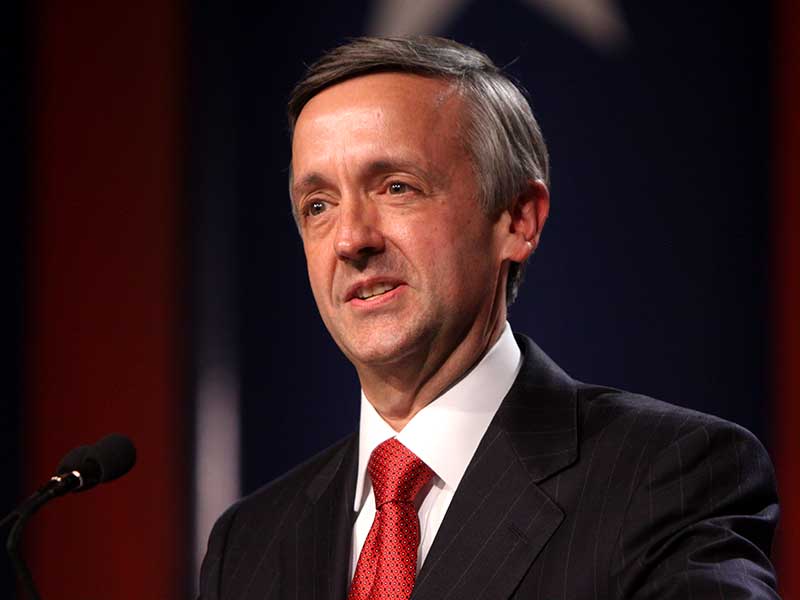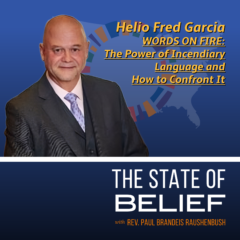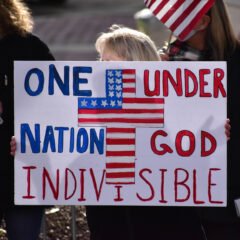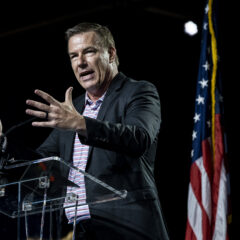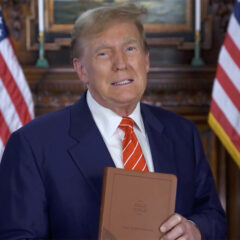(RNS) — Who knew that a simple meeting between a preacher and a pundit would be so controversial? But it starts to make sense when you consider the preacher. And the pundit. And the meeting itself.
At First Baptist Dallas last Sunday, pastor Robert Jeffress took time out of his worship service for nearly 15 minutes to interview conservative Fox News host Sean Hannity. The purpose of the meeting was to promote the feature film “Let There Be Light,” which Hannity executive produced. The movie tells the story of a combative atheist, Dr. Sol Harkens, who eventually converts to Christianity. Early reviews of the film have been overwhelmingly negative, but the narrative will likely connect with heartland Christian audiences who believe their worldview is under attack from atheists and secularists.
The clip of Jeffress’ interview was criticized by many online, including some conservative Christians, who feel that using a church service to promote a film with a political message is inappropriate.
Texas-based Bible teacher Beth Moore tweeted, “Mars. I’m telling you. We’ve awakened to Mars.” Florida pastor Dean Inserra responded, “Speechless. Long way from the scarlet thread sermon in downtown Dallas.” And Republican Sen. Ben Sasse tweeted, “By the way, we’re talking about Sunday here. (You can be free of politics.) And Christians: Are we really ignorant of the Scriptures? ‘Jesus answered, My Kingdom is not of this world. John 18:36.'”
Jeffress shot back at Sasse in a tweet of his own, saying, “Jesus also said His followers are to influence the world for good. Matt. 5:13.” The Dallas pastor later stated in an interview on Fox News radio that he felt it was inappropriate for a politician to criticize the actions of a local church pastor and demanded that Sasse issue an apology.
Jeffress’ actions are even more confounding when one considers that Sean Hannity is a committed Roman Catholic. In a 2011 sermon, Jeffress stated that Catholicism is the result of a “false religion” that originates in ancient Babylon:
And today the Roman Catholic Church is the result of that corruption. Much of what you see in the Catholic Church today doesn’t come from God’s word. It comes from this cult-like pagan religion. “You say, ‘Well now pastor how can you say such a thing? That is such an indictment of the Catholic Church.’ After all, the Catholic Church talks about God and the Bible and Jesus and the blood of Christ and salvation. Isn’t that the genius of Satan?”
Jeffress told me via email that his comments on Catholicism have been “ripped out of their context.” He added that he believes Hannity is a “fellow Christian” despite any theological disagreements they may have.
“No one goes to heaven in a group. We go one by one based on our relationship with Christ,” Jeffress wrote. “There will be millions of Catholics in heaven who have put their faith in Christ for the forgiveness of their sins. There will also be millions of Baptists in hell who have not put their faith in Christ.”
In a statement issued by Jeffress after the interview, the talk show host said: “I was raised a Catholic, I was even an altar boy, and attended seminary, and I can tell you that Dr. Jeffress has expressed to me both privately, and publicly, that he agrees Catholics are Christians.”
Still, the tension remains between Jeffress’ previous comments and present actions. As a Roman Catholic, Hannity practices what Jeffress believes to be a corrupted, pagan religion. Why then would the preacher offer the pundit 15 minutes in the middle of a worship service to speak to his congregants?
Perhaps it is because the bonds binding Hannity and Jeffress are primarily political, not theological. A few weeks before Hannity spoke at First Baptist Dallas, the church hosted Ainsley Earhardt, another conservative television personality, who co-hosts “Fox and Friends.”
I pressed Jeffress on this point via email, asking him whether he would offer the same platform to someone who shared his theology but diverged with him politically. Would he, for example, interview liberal evangelical Jim Wallis? And if not, why not?
Jeffress responded, “The criteria we use in selecting guests for these kinds of segments is that they must be a born-again Christian and they must be well-known enough that guests would be motivated to come.” He added that he would not offer such a platform to a figure like Wallis: “I believe Jim Wallis is a fine Christian from everything I know about him, but for the purpose of attracting guests who will hear the Gospel from me, we have to use people guests would be familiar with.”
We’ve undoubtedly entered a moment during which partisan politics have infiltrated the church to a degree not witnessed since the emergence of the Moral Majority in the 1970s. While Christians mustn’t withdraw from the public square altogether, they are too often used by politicians and activists for partisan ends. So the questions and criticisms being raised in response to this interview are fair and needed.
Jacques Ellul, the French philosopher, once famously remarked, “Politics is the church’s worst problem. It is her constant temptation, the occasion of her greatest disasters, the trap continually set for her by the Prince of this world.”
If Ellul is correct, and I think he is, then what he said certainly applies to the kind of interview Jeffress conducted with Hannity in his church.
